A Gift in Lebanon
Mar 21, 2013, Updated Apr 05, 2023
This post may contain affiliate links. Please read our disclosure policy.
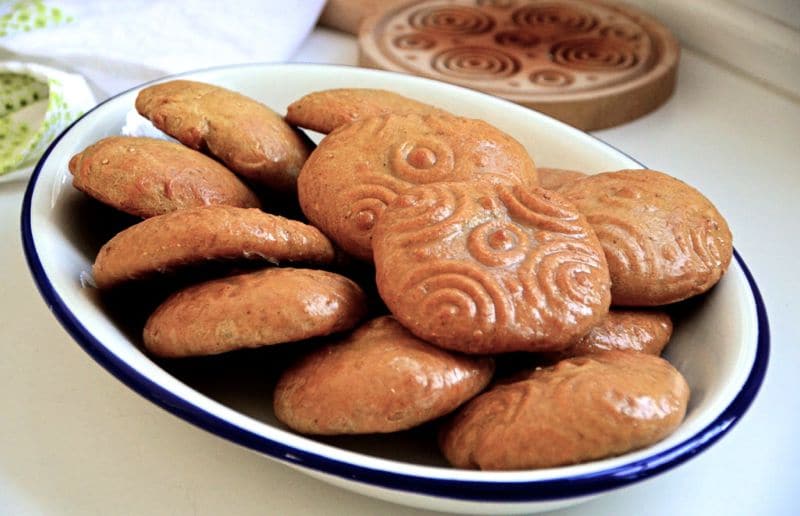
At first everything seemed so small, which probably had to do with the narrowness of the streets and the way the homes were built almost up to the road. It was the second day of the trip to Lebanon that I had been thinking about about for the better part of my life, and already I felt a kinship with the very bedrock of the old country, a ubiquitous creamy stone that lies not too far beneath the topsoil. Along the highway leading to the village of El Mtein, one could see what appeared to be huge bites taken out of hillsides, revealing the stone underneath.
By 11 a.m., after a few stops to ask which way, we pulled up to one of the many stone houses—some rehabbed, others war-torn—lining the village streets. Waiting for us outside the front door were my cousins, along with the obvious matriarch of the family who is mother and grandmother to the clan all living together under her roof. She was holding a plate of her ka’ik (it was Easter season, and ka’ik is for Easter), offering it along with the kind of kisses that every Lebanese Sitti gives to her family and to all small children, Sitti kisses that are repeated over and over again against the cheek like a story too good to stop telling.
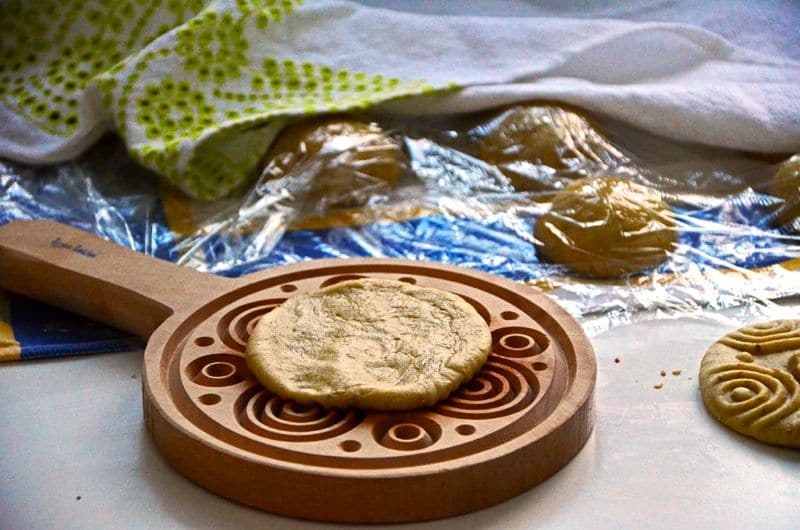
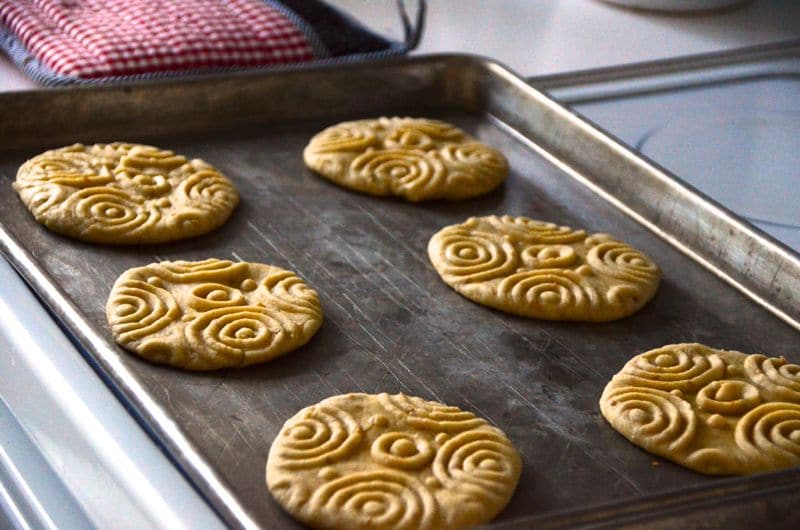
That none of us had met before seemed irrelevant as we recognized the family-feel in each other’s faces (it’s all in the eyes, honey) and hugged it out, reunion-style, there on the front porch. We started eating immediately the semi-sweet ka’ik, Rosalie’s being more biscuit-like than the bread versions we make. Watching my mother eat those cookies amid her people instructed me about the swoon response she has always had to the flavors of ka’ik, the mahleb and the anise: these are the flavors and fragrance of home, even a home and people she hadn’t met but always knew, in her own way.
Mom had said from the start that she would not make this trip to Lebanon with us, it was just too much for her, and then days before we left she heard me reading a message of welcome and anticipation that I’d received from her family. She looked around the table and announced, simply: I’m going.
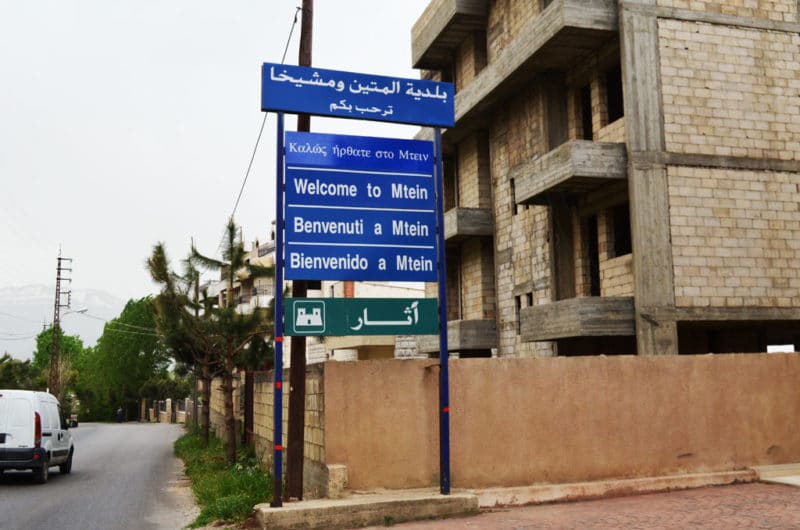
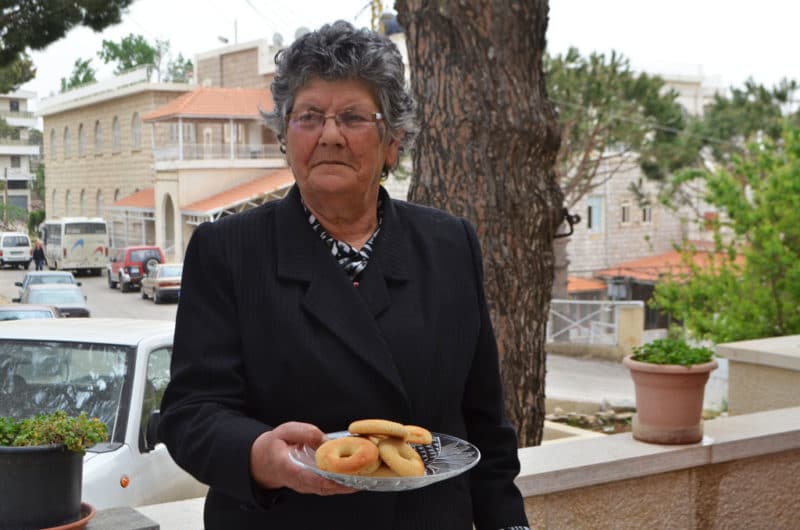
Inside, the coffee and cigarettes came out (the smoking there is as common as the little cups of intense Arabic coffee) as we dove into the family tree. Rosalie’s husband, rest his soul, is my mother’s cousin; their fathers are brothers. Turns out the family name, my mother’s maiden name of Abowd, was actually Nacouzi in Lebanon. This discovery was made by my cousin Mary years ago; she was the first of my generation in the family to venture to Mtein, so we weren’t taken aback by this news. But tracing the name to its roots suggests something of Greece, and once that came up we turned out attention elsewhere fast.
We walked around to the back of the house, where a rebuild was in progress. The front of the house was newer, but here in the back stood the original structure that is somewhere in the ballpark of 150 years old, and perhaps older. At the heart of this side of the house is the room where my grandfather was born. In the midst of its rehab, what we saw was dusty and dark, but even that couldn’t detract from the remarkable arched stone walls and ceiling. Must have been a spartan birth, and chilly in here, my mom said, probably imagining giving birth to her five children in a space like that.
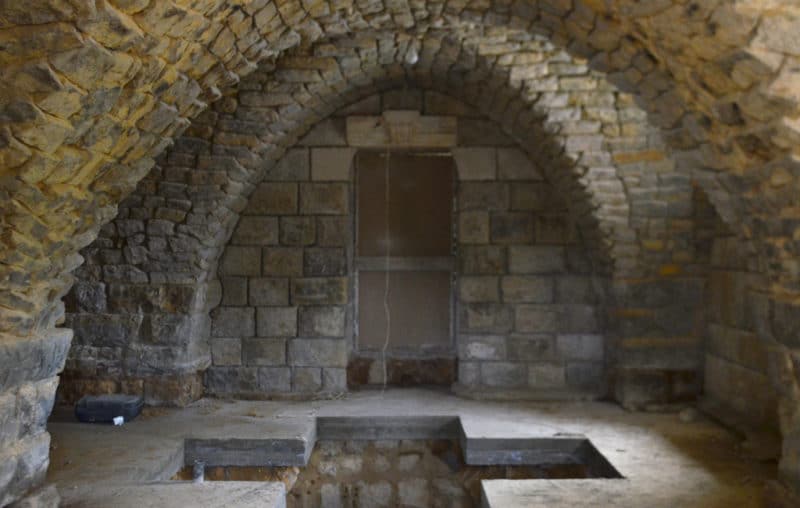
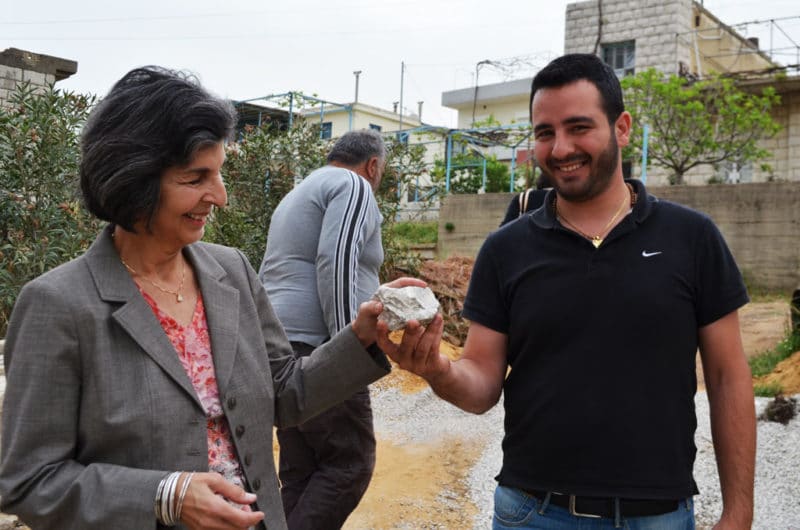
There were piles of the beautiful stone bedrock of Lebanon all around the construction site of the house, chunks that were heavy and laden with dust. One of the cousins must have sensed the magnetism the stone had for my mother, who was looking them over as though scanning for a lost treasure.
Chadi picked up a craggy stone and handed it to her; she accepted with the same deep breath with which she had accepted the ka’ik, the Sitti kisses.
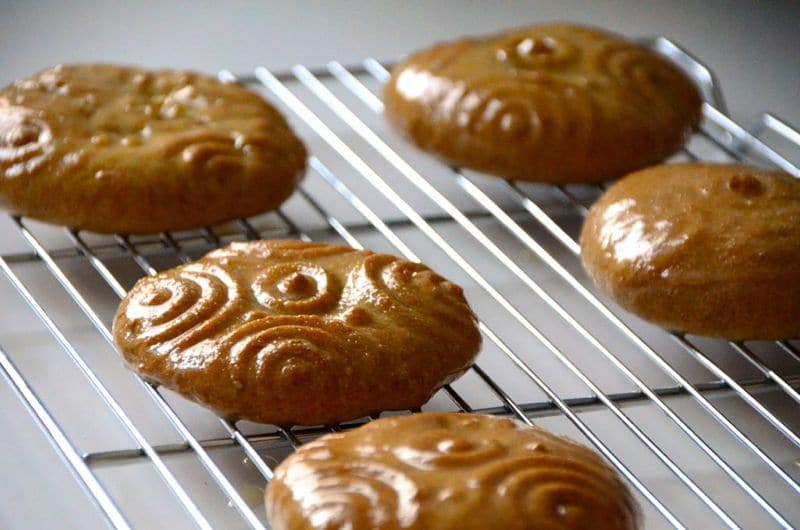
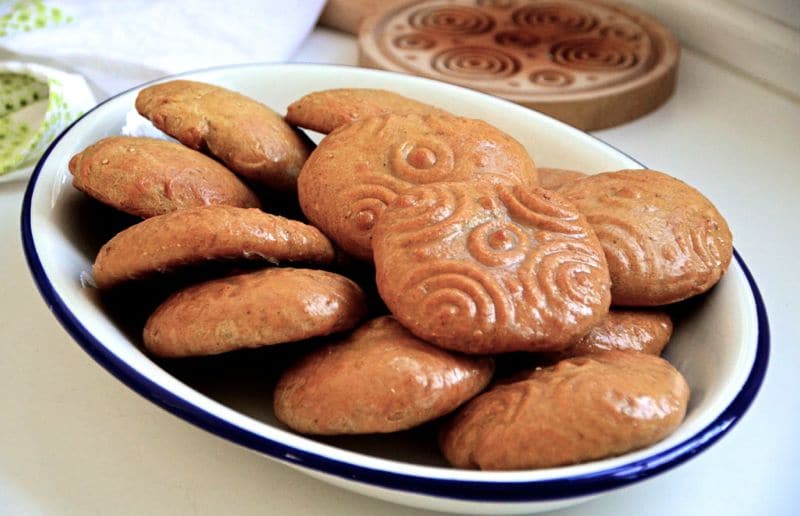
From the trip to Lebanon we brought home gold, we brought holy little trinkets from Our Lady of Mount Lebanon and St. Charbel’s monastery to hold us close to what we saw and did and felt. Above all we brought a piece of Grandpa Abowd’s home. Touch the stone, and a powdery dust lingers on your fingers like its own version of a Sitti kiss, just long enough to whisper its story in your ear now and again.
___________
Get the recipe for Lebanese Ka’ik here!
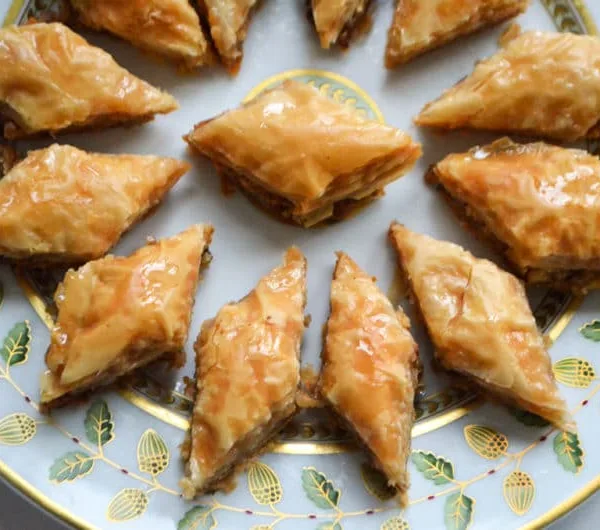
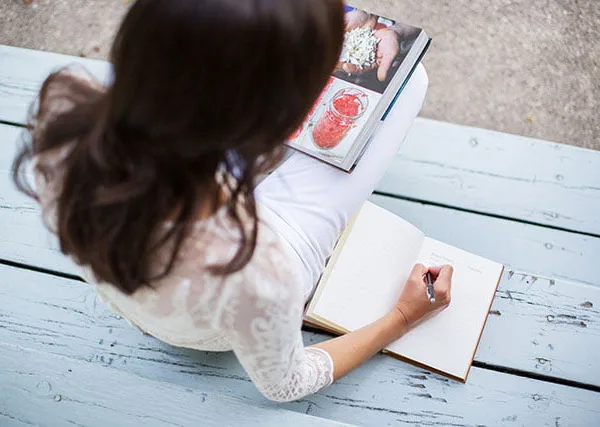
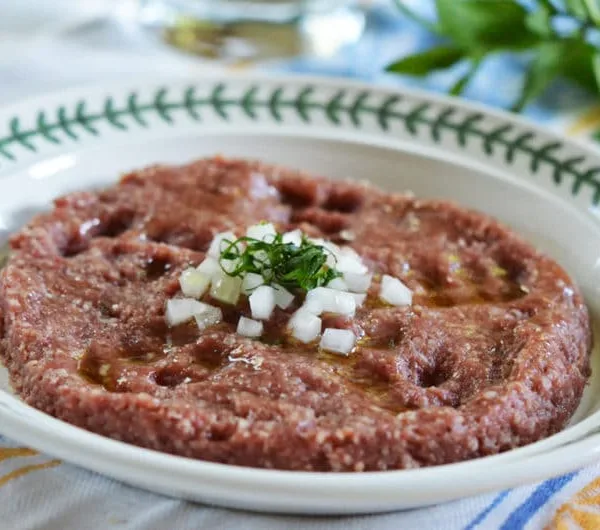
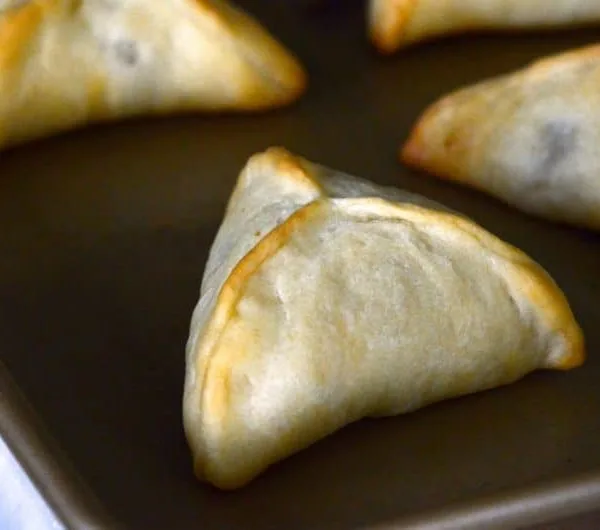







What a beautiful story I really enjoyed it. I have married into an Egyptian family I am British. I would love to make this for my family in England I love all kinds of Ka’ik and have made several variations. Can you tell me though. What is Half and half? We don’t have it here I googled it but I’m not sure I’m any wiser.
Hi there, and thank you! Half and half is a combination of half whole milk and half heavy (whipping) cream.
You might also like to see my just-published tips for an enhanced ka’ik recipe with a different glaze here.
Thank you so much for sharing your story and recipes with us. I, too, hope to one day visit the land of my “ancestors” (my grandfather was born in Lebanon and emigrated in early 1900s). I can’t wait to try your recipe for ka’ik, my favorite Lebanese desert.
Thank you so much Shelly–I hope you do go, such a remarkable experience.
Thank you so much Maureen for this post. The Ka’ak look just like my grandmother made.
Your comments on the trip to Lebanon was so touching.
Do you have a recipe for the Ka’ak the lady was holding in the photo in this article?
Just a comment, the light green color on the type in your cookbook is hard to read..just a thought!
Keep these beautiful posts coming, it makes me feel I am on the trip with you!
Thanks
Hi Sue–find the recipe for crunchy ka’ik biscuits on my blog here. Thank you for your kind words, and sorry you had trouble reading the titles in my book!
I like the spices etc. but I want to make a cookie and don’t like the cake or biscuit could I use baking soda or baking powder.
Try the cookie version here!
Thank you so much for your story and recipe. My mom has always had hopes of one day visiting Lebanon and meeting her long “lost” relatives. I, too, would like someday to make that journey!
Oh thank you Shelly! I hope you do too!
reading the comments, I see I must have read this several years ago and commented before! We won’t be making ka’ick this year. it’s such a production and my dad will be having back surgery on Monday of holy week and now my sister has 3 month old twins and I have a three year old. So… too much… but reading this again re-sets my intention that my son will know the food of his heritage. That he calls my dad Jido is already step one. Thanks again for your beautiful writing.
Thank you Anice! You’re giving your son a great gift!
Hi Maureen, my name is George Azar and my Sitty and Jitty were from Lebanon, my sitty actually was born in Savannah GA, born of lebanese heritage. She was sent to Lebanon by her father at a young age (6-7) to help with some relatives farm. Sitty had a prearranged marriage with my Jitty and was sent back to Georgia when she was 16-17. She could not speak english, only arabic. When she arrived to the states her father met her and they rode a train to Savannah, my Sitty had no idea who the man was with her! She married and eventually settled in Atlanta, Ga and raised a large family of boys and girls. I loved my Sitty kisses and the way she would pronounce my name and I would sit with her for hours listening to her broken english, telling me all about her time as a child in Lebanon. I will always cherish those times. On Saturdays we use to ride over to her house and before we could get out of the car, the smell of fresh syrian bread (pita) was filling the air. I would run back to the kitchen and sit at her gigantic table covered linen and hughe loaves of bread, pipping hot, in front of me. I watched her roll and stretch the bread and then put it in the oven with a wooden peel all the while she was telling stories or Lebanon and her youth. My love of lebanese food was born then. Hot pita smothered in butter, Laban, Labneh, coosa, Lubie, grape leaves and then at Pascha, EASTER COOKIES!
I have been teaching my grandson, 8 years old, how to cook Lebanese food for a couple of years now. He loves to make Fatayers and loves the spinache the best, he is just about ready to make Baklawa by himself, we have made it many times together taking turns on who will do the buttering and who will place the phyllo leaves. This past Pascha we made Easter Cookies, I even bought him his own set of moulds for mamoul. We shape our Easter Cookies in the shape of an S, 8, and circles, pinch the top with our specials little pinchers and stuff them with dates, he absolutely loves them.
I am so glad I found your site, I feel like family after reading about your mother and sitty and jitty, We will be trying out some of your recipes and I know they will be wonderful, I can smell all this delicious food right here at my computer. Thank you again for your recipes and pictures, they bring tears of joy and memories to me. I have 4 brothers and a sister and unfortunately I am the only one in the family passing along these beautifully tasting recipes and love every second teaching my grandson how to cook them while telling stories of my Sitty and Jitty while growing up. Sorry this is so long so I will go and tomorrow I will go shopping for all my food that I will need to make Spinach Fatayers, rolled cabbage and coosa!
Special George, thank you for sharing!What a lucky grandson you have!
Reading of your trip to Lebanon and meeting cousins whom you had never met before rang very true for me. For years I looked for my mother’s half-brother who was left in Lebanon as an infant. My grandmother’s first husband had died during her pregnancy and when the baby was born, in the early 1900’s, he was considered the “property” of the husband’s family. This family was very cruel to her and she had no choice but to come tot he U.S. to be with her brother with the promise that the priest would go back and get the baby. The would never return the baby to her, first they said he died and then they just said no. She was brokenhearted. She married who would be my grandfather in the U.S. and had my mother and her sister. She died when they were just 5 and 6 years old. I looked for my mother’s brother for about 15 years….not an easy task. Many of the surnames in our family are the same (same village, same name) which did not make it easy. About a year after my mother passed away and five years I would learn from her brother’s passing my mother’s great nephew called from Sydney AU. He had seen my posting on the genealogy sites. I was able to speak with my mother’s niece, her brother’s daughter. I learned that he married at age 14 and had 10 children, many of whom were still living. My husband planned a trip to Sydney to meet these wonderful cousins. From the minute I got off of the plane and saw those wonderful people standing there I knew they were mine! 100 years came rushing into my heart and my missing piece was found. We had Lebanese feasts every day for two weeks and the cooking was that of my mother and paternal grandmother. Another way I knew they were mine. We speak in one manner or another every day. I can’t wait to visit Lebanon to meet the rest as well as visit Brazil. I guess my mother and her family had to all be reunited in heaven before we could all be together. As I love to say, and as my grandmother said to me in a dream, “Now we can dance”.
Wow wow wow, Nora! What an incredible, epic story! Your tenacity in your quest has been so richly rewarded! My heart is warmed by this beautiful reuniting of Lebanese family across the world. Thank you so much for sharing it here!
Maureen; Congratulations on your recognition by The New York Times! When the Food Editor finds you, you have been found! What an honor. Donna
Many, many thanks Donna!
I made your recipe. It was delicious. I took it to our family Easter Dinner. Everyone raved the Ka’ik was the best they have ever tasted. I also took a bakery purchased Ka’ik to the dinner just in case. No comparison in taste. The bakery bread was tasty, but dry. Mine was moist and truly wonderful. Thank you.
Just a side note, if you print the directions from the “print here,”…….those directions leaves out the words …….combine the yeast mixture to the bowl. In other words, the printed directions leaves out when to add the yeast.
Other than that….perfection!
That is music to my ears (and eyes), Thelma! Thank you for sharing and for the detail about the PDF recipe. Much appreciated!
I have been searching for that exact kaak recipes for decades,I can,t thank you enough.plz send me any sweet,or home made recipes,I would love to try of them.
Happy Easter to you and your family.
Nada, my Aunt Louise will love knowing that, as I do, thank you. Happy Easter to you and yours!
Dear Maureen, I am thrilled by your story and the recipe for what we called “Easter bread”. Our grandmother Jemelia Shaheen was a wonderful cook but never really wrote down her recipes. Can’t wait to try it. Thank you. Kathy
Wonderful Cathy, thanks so much. My fiancé is a Shaheen!
Hi, Maureen,
I’m so happy to have found your website and recipe. I collect (and use) cookie and butter molds and bought a beautiful large wooden mold on ebay a couple years ago, not knowing what it was for. I guessed that it was Middle Eastern in origin because it reminded me of my mammoul molds. I just saw a similar mold on ebay with the note that it was for ka’ik, so I immediately did a search and found your wonderful recipe! I can’t wait to try it. Thanks so much for sharing!
That is so cool Wendy! Cool that you make a collection of cookie and butter molds, and that you wrote! Let me know how you enjoy the delicious ka’ik.
my non-Lebanese mom has taken over the baking of the ka’ick every easter. We use the bottom of a cut-glass ashtray as our press. She always sends me some if I can’t make it home for the holiday.
Beautiful words and photos, cousin, just breath-taking. Thank you for the report.
A wonderful version of the kaak b-haleeb (milk cookies) with the best spices! We used to get the ring shaped ones with anise version but i like this one too! Great post and happy Easter!
Cousin this is a wonderful story and the pictures are as well. Happy Easter to you and your Mom and the rest of the family.
You know that Louise’s recipe would be wonderful!
Thank you so much for this–I’ll try it as soon as I can find the time. The ka’ik that I’m used to from my ex-mother-in-law are more of the bready type, so I may skip the glaze. I’m trying to remember how she shaped them–sort of a twist shape, I think?
Maureen, your trip, pictures, words are for all of us who have not ventured across the sea to our homeland. My parents never went, nor have any of my maternal Atty aunts/uncle, nor have any of my maternal Atty cousins. All of the Nassir uncles and cousins have been with the exception of myself. You have made this possible for me–I am so grateful for your gentle sensibility and your talent to translate emotions into graceful words. Happy Easter Maureen, to you and yours!
Maureen,
My aunt always made the donut shaped Ka’ik like the one in your photgraph. Is the recipe basically the same but you roll the balls into ropes and then make a circle?
That should work fine, Mary Anne. Be sure your ropes are thin enough so that when they puff in the oven, there is still a hole in the center of the ring.
Thank you Maureen! This American who married into the Lebanese tradition will be serving Ka’ik this Easter. Found the mahleb yesterday at a Lebanese market and have ordered the mold. It looks “do-able”… thanks for including the pictures! They answered many questions.
Happy Easter Cousin Maureen (We must be cousins somehow)..you have made the season happy for me with this reminder of Mama’s ka’ik and Sitto kisses.
Thank you for the most heartwarming story, yet. I hope that we can plan a trip to Lebanon soon. Our recipe for Ka’ik is different, more like a hard donut shaped cookie. It is one of my favorite things! I cannot wait to try your recipe, too.
Oh delightful. Home, bread, kisses. Can hardly wait to try this.
This piece gave me the chills, Maureen. Wonderful.
I had the opportunity to taste my cousin’s baking of your recipe for Ka’ik…..It was something that I cannot explain with regard to my heritage, and my mother and aunts and Sito baking this for all of us. I tried it once and couldn’t get it right. My cousin, however, Alexis Alhandy, just made it for her aunt’s 90th birthday party and it was absolutely wonderful. It gave me the chills and instantly made me feel my family through my whole body.
I am new to your website and will continue to read it page by page. I am Arabic (full blooded) and love the food. This is one thing I have not been able to make. I did win an award for my Baklava and that is much easier to make.
thank you for your wonderful recipies………..
Lila, you made my day! That is just so special, and beautiful words–thank you for taking time to share, and please keep in touch, cousin!
Lila – I was just reading this website to see how others make ka’ik. When I read what you said: “It gave me the chills and instantly made me feel my family through my whole body”, is EXACTLY how I feel when I make it, and eat it. I feel my Sito, my mom and all my aunts and cousins that have been part of this wonderful process. May these traditions follow our families through the years.
Thanks so much Valerie, very special.